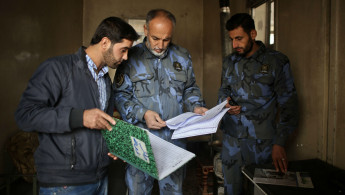Syrian extremists set for boost as UK suspends aid to opposition police
The BBC Panorama report is also let down by "false or misleading claims" and the production team has not responded to complaints, says Access to Justice and Community Security (AJACS) - which runs the Free Syrian Police programme on behalf of six donor countries.
Jihadis You Pay For is due to be screened on the current affairs programme on Monday evening, and alleges that some UK funding paid to the Free Syrian Police has fallen into the hands of extremist groups - such as the al-Qaeda linked al-Nusra Front.
Ahead of the programme's screening, the controversy led the UK to suspend aid to the unarmed security force. As the UK acts as a funding channel for other donor countries, the move has effectively dried up the FSP's funding.
Boost for extremists
"The FSP is an unarmed, community police force delivering accountable and responsive services to over 1.5 million Syrians in opposition-held areas of Syria," David Robson CBE, team leader at AJACS, told The New Arab.
"Almost 3,400 brave and dedicated officers across 50 locations are helping their communities to resist the malign influence of armed groups, and are backed by six government donors.
"AJACS forms part of the strategies of our six donor governments to counter violent extremism. Suspending support just leaves the way open for these armed groups to fill the vacuum that the FSP would leave behind."
Robson said that the crucial services provided by the officers are well received by communities in Aleppo, Daraa and areas of Idlib province outside al-Nusra-led Hayat Tahrir al-Sham (HTS) alliance control.
More than 80 percent of people interviewed in opposition areas said the FSP was their most trusted security provider, the group claims.
FSP is mostly staffed by former government police officers who defected during the revolution, and their duties include general policing and monitoring highways.
However, the BBC claims FSP officers are present in areas where extremists operate, including the territories in Idlib province controlled by the Jund al-Aqsa jihadi group.
The programme also alleges that FSP officers blocked roads allegedly leading to two women being stoned to death by Jund al-Aqsa officers, something which has been disputed by AJACS.
 |
Suspending support just leaves the way open for these armed groups to fill the vacuum. |  |
Robson said that the BBC report ignored complex issues involved in delivering aid to opposition areas and the Panorama allegations were based on an incomplete understanding of the FSP's work.
Of the $20 million so far directed to the Free Syrian Police, AJACS say only $1,800 was lost to sympathisers of al-Nusra Front - a leading force in the HTS rebel alliance - and this money did not come from UK taxpayers.
AJACS added that other allegations by the BBC - that the Nour al-Din al-Zinki rebel group - which recently left the HTS alliance - had interfered with the FSP were misleading, as the group was not proscribed by Western governments at the time.
Another claim in the Panorama report, that the UK was funding an "unmanned police station" in Idlib province was misleading, AJACS said, as officers had been redirected to other areas where they were more needed.
Robson said the station had been closed and officers redeployed to surrounding stations.
He also claimed that the allegations bore striking similarities to complaints made by a former employee who had been dismissed for their conduct and had threatened to "go to the media" unless AJACS paid them "compensation", Robson added.
From Free Police to police-free
Brigadier Abid al-Shallaf, commander of the Aleppo FSP, said the funding cuts would likely have a devastating impact on civilians in his northern Syrian province.
"If the FSP ends, we are opening the field for extremists who are awaiting such an opportunity to take over security... and the Islamic police will take over," Shallaf said.
"The local community has already [had] armed groups... as an alternative to the police, six years ago, and they were faced with chaos. Military individuals do not have the expertise in dealing with civilians, nor the professional conduct."
Shallaf also disputed the BBC's claims that FSP money regularly reached extremist groups, and said the channeling of funds to opposition areas is closely monitored by AJACS.
AJACS insist it takes a robust approach to ensuring the FSP officers have no dealings with extremist groups.
One police station in Aleppo was closed down by the organisation after it was discovered that one of the ten Local Administrative Council members had links with HTS.
The police force has been also been a frequent target of the Syrian regime, with 13 officers killed when a station was shelled by forces loyal to President Bashar al-Assad. Locals have also praised the FSP's work and said their presence has helped provide security to an area wracked with violence.
The BBC said it stands by the claims made by the Panorama documentary - but would not comment on claims the suspension of UK aid to the police force could benefit extremist groups. Nor would it confirm if AJACS complaints to the broadcaster has been ignored.
"The BBC is confident in its journalism and the investigation will be broadcast in full on Panorama tonight," the broadcaster told The New Arab.
"For background we wouldn't comment on speculation ahead of [transmission]."
Jihadis You Pay For will be broadcast on BBC1 at 7:30pm on Monday. It will also be available on the BBC's streaming app after broadcast.
Follow The New Arab on Twitter: @The_NewArab



